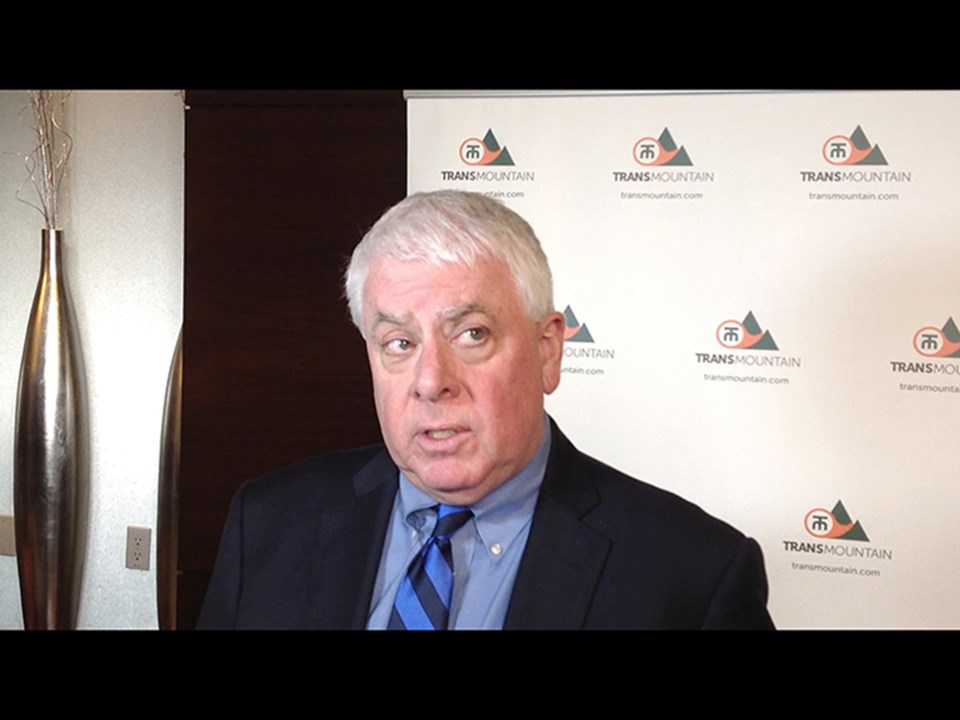How does Burnaby stand to benefit from the Kinder Morgan pipeline expansion? That was the subject of Ian Anderson's talk at the Burnaby Board of Trade luncheon on Wednesday, and the Kinder Morgan Canada president is promising jobs and millions in tax revenue for the city.
Anderson spoke to the business crowd gathered at the Delta Burnaby Hotel and Conference Centre, outlining the benefits of the proposed pipeline expansion.
"I've always thought: are those benefits worth the risk?" he said. "Are those benefits worth jeopardizing our beautiful environment in British Columbia, and I know that's foremost in everyone's mind."
Some of the benefits include additional tax revenue for the City of Burnaby. The existing Trans Mountain pipeline generates an annual $7 million for Burnaby, but that's expected to rise to $13 million if the expansion is approved.
According to a video accompanying Anderson's presentation, the money could cover an extra 132 firefighters per year or more than cover annual garbage costs for Burnaby. Each tanker that docks at Burnaby's Westridge Marine Terminal injects $310,000 in value to the local economy, according to Anderson's presentation.
Anderson promised the company would prioritize hiring locally whenever possible and that there would be opportunities for Burnaby contractors, but data he presented to the crowd showed most of the jobs would not be local hires. Anderson said the Burnaby workforce would peak at about 600 jobs. As for permanent post-construction jobs, the company estimates there will be 50 in B.C.
If the expansion is approved, Anderson said there would be a working hub, either in Langley or Surrey, and that there would also be economic benefits for Burnaby, stimulated by work at the company's tank farm and the Westridge Marine Terminal.
Anderson also cited the Canadian Chamber of Commerce, which states that lack of market access (meaning the inability to get more of Canada's tar sands crude to oil companies) has cost Canada as much as $50 million a day.
Anderson also announced that the company would file an application with the National Energy Board on Dec. 16, and public hearings would likely start next fall. Kinder Morgan wants to twin the existing pipeline and nearly triple capacity from 300,000 barrels a day to 890,000, causing a spike in marine traffic from five or six vessels per month to 30 or 34.
If the board approves the expansion, Anderson said the $5.4 billion project should go ahead in early 2015 and will be complete in late 2017.
Anderson was well aware of anti-pipeline sentiment in Burnaby, a city where the mayor and council have publicly opposed the expansion and residents have had their homes sprayed with crude after the 2007 Kinder Morgan pipeline rupture.
"I'm the first to admit that there's no way people would put up their hands and say, 'I want a pipeline down the street, I want a pipeline in my yard, I want a pipeline adjacent to the school.' We understand that," he said. "And we need to do that as sensitively and as neutrally a way as we can to understand and respect those interests, while at the same time providing something that offsets that."
Anderson said Kinder Morgan has invested almost $400,000 in community programs in Burnaby alone since 2007.
After the presentation, Anderson fielded audience questions on oil spill risks, the number of permanent jobs, tanker traffic and relations with Burnaby and Vancouver mayors.
"We're in the pipeline business. I understand that has an impact on people. I won't apologize for that, but I'll try to mitigate the impact as best as I can," he said.



